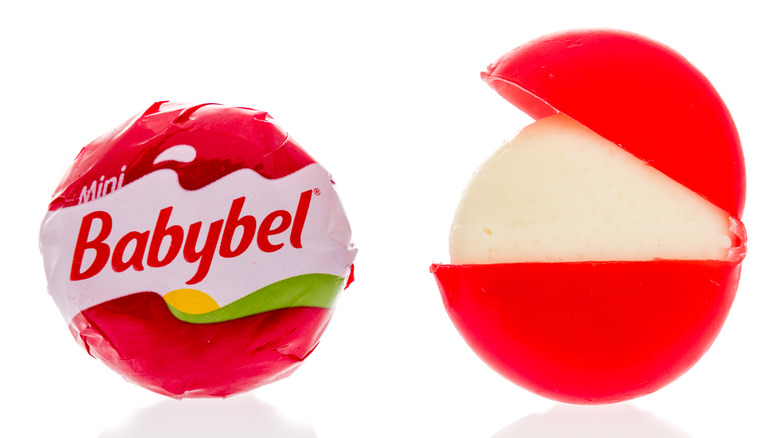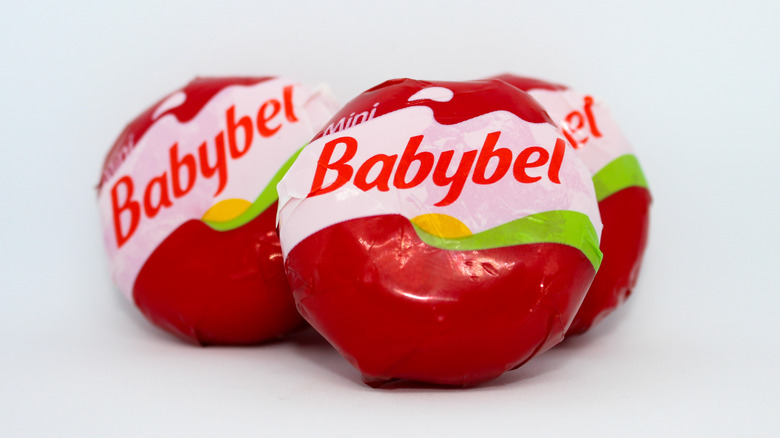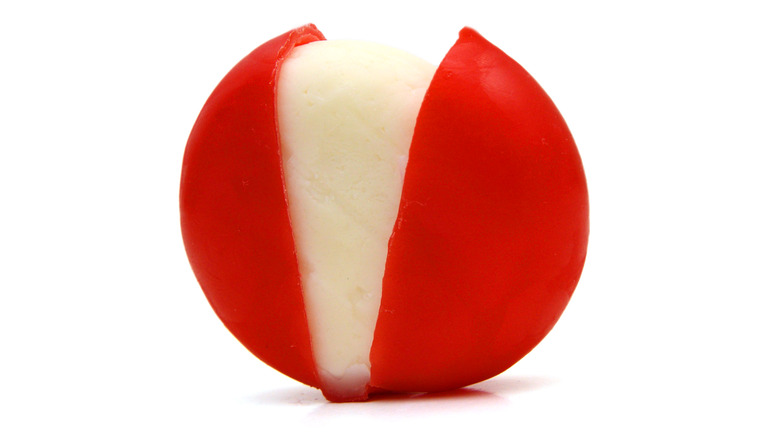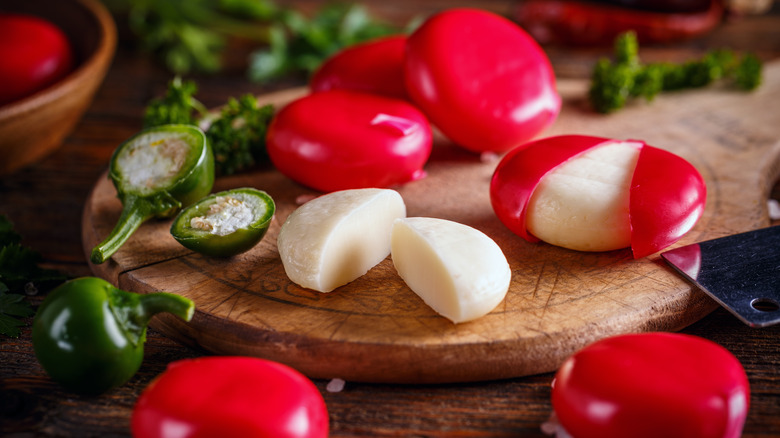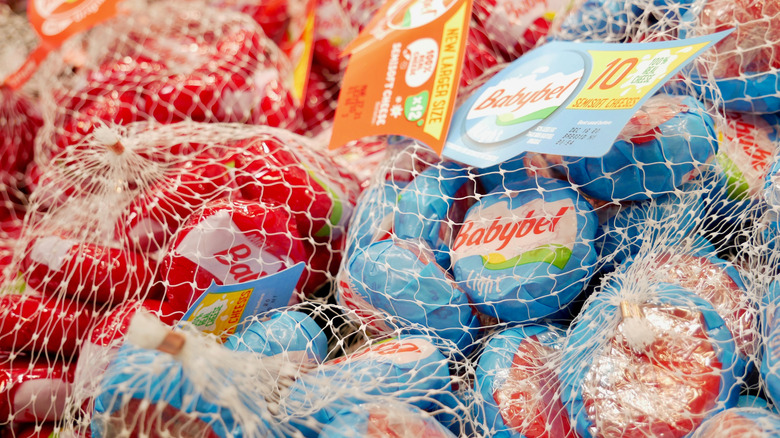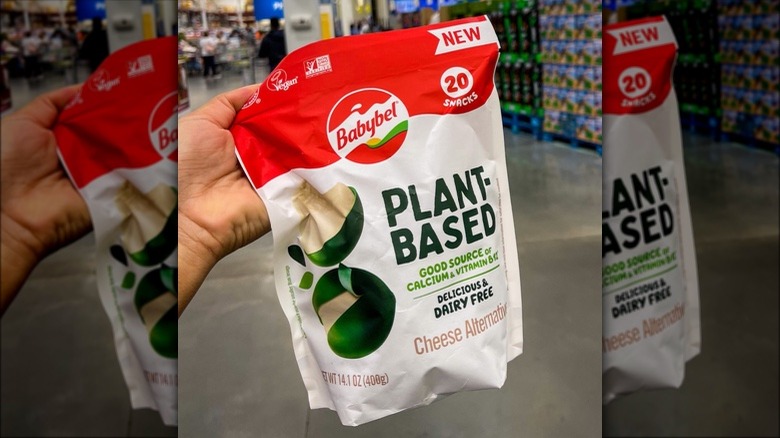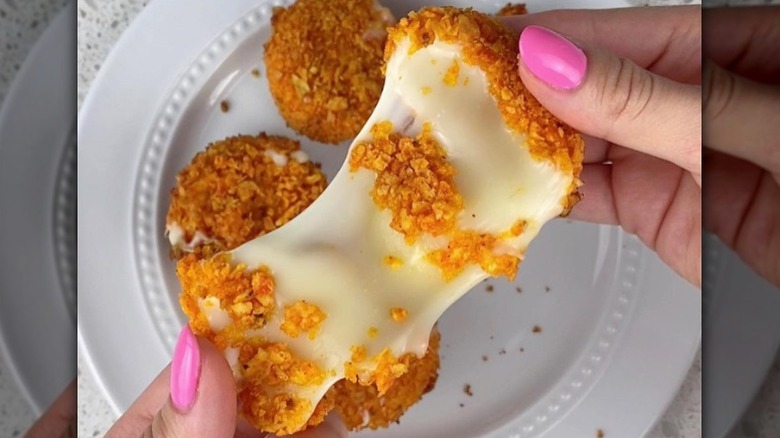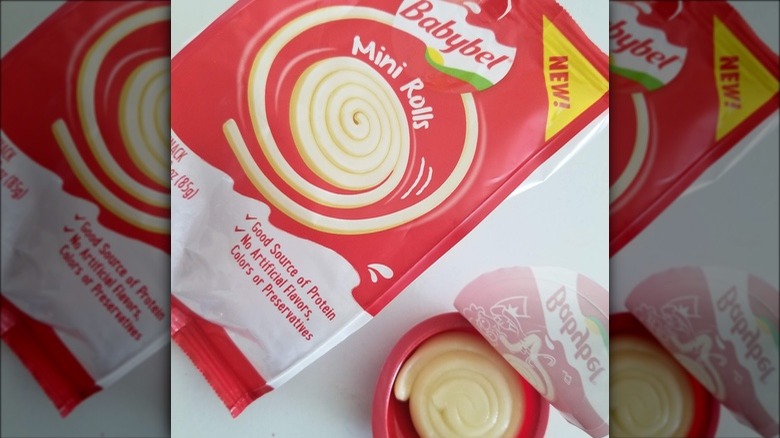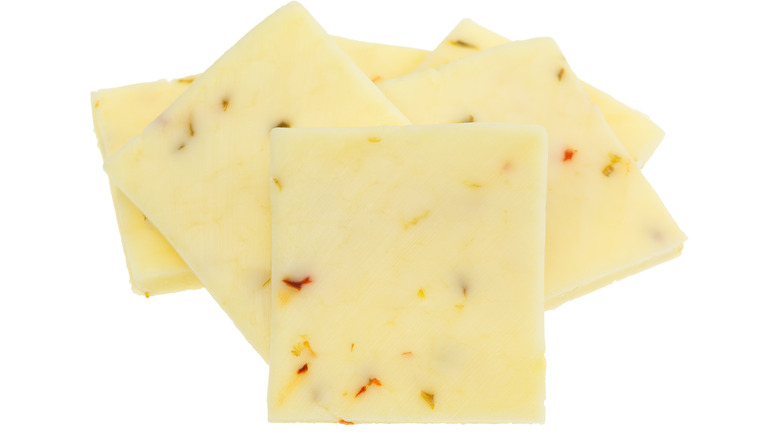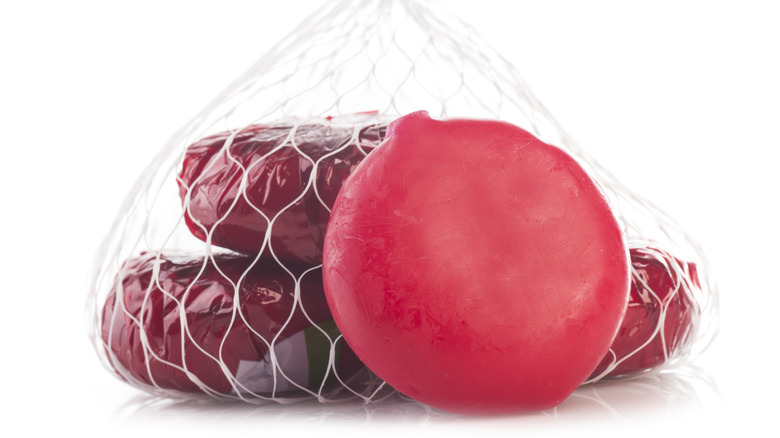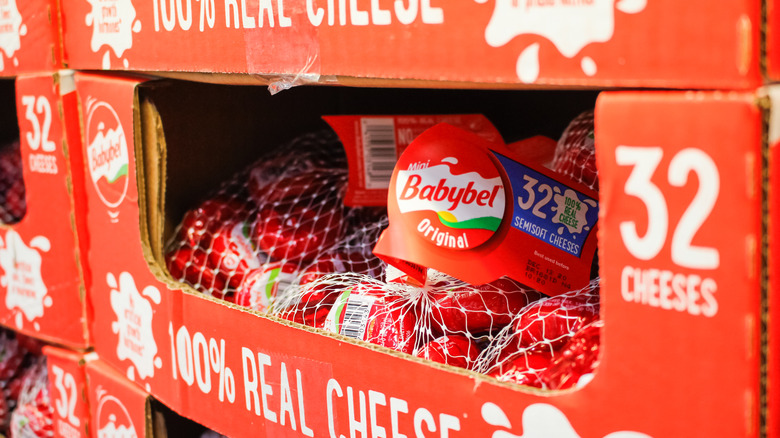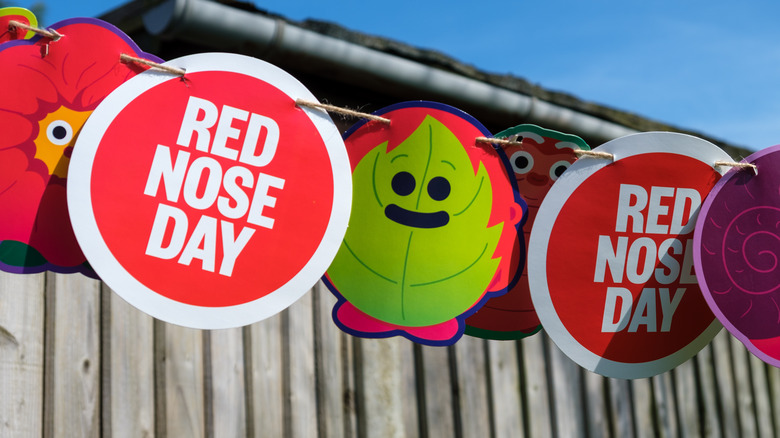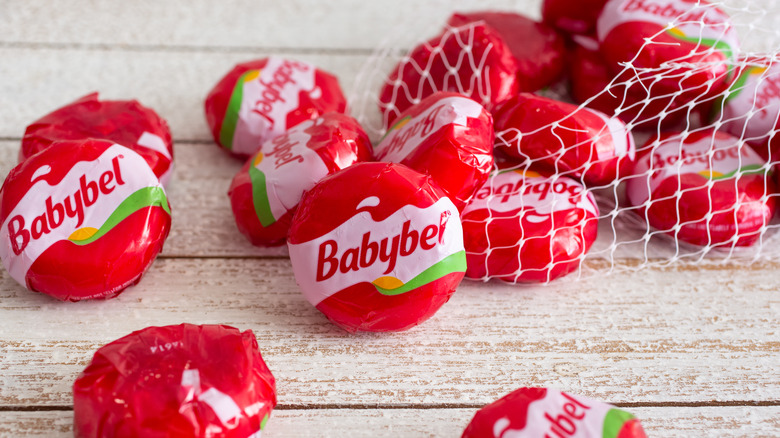Babybel Cheese: 12 Facts About The Popular Snack Food
Babybel is a small cheese wheel best known for its red wax wrapper and convenient portions that make it a popular snack option and an ideal addition to school lunchboxes. This French cheese has come a long way since its beginning in the mid-20th century when its pleasant, milky flavor and soft texture were immediately approved by both children and adults. The release of the mini version sealed the deal, allowing Babybel to conquer the world and become a global phenomenon. Babybel is now available in over 50 countries, and every year company sells more than 2 billion wheels of Babybel cheese.
With such an impressive background, Babybel has tons of stories to tell, with many milestones that show how a humble, family-run cheese business ended up creating an internationally-loved, iconic cheese snack. These Babybel facts will lead you through a story filled with visionary ideas, innovative products, and clever marketing strategies. Of course, it's all supported by the original product — a small wheel of cheese made with real milk that fans say has never compromised on quality.
Babybel cheese debuted in in 1952
Babybel is a French brand currently operating under Bel Group, a family-owned multi-brand company mostly specializing in processed cheese products. The brand's origin goes back to the mid-19th century and Jules Bel, who started a cheese trade in the alpine Jura region in the east of France. His son Léon Bel continued the family tradition, but he had plans to expand his father's idea in a completely new direction. In the period between World War I and II, Bel recognized the potential of processed cheese products that could be stored for longer and would be ideal for transport. The business started with Laughing Cow and individually-packed triangles of spreadable cheese.
The company expanded with Babybel, which was first registered in 1933 and officially launched its cheese production in 1952. The original version was a hefty 200 grams of cheese encased in red wax. In 1977, the company introduced its mini version that would prove to be the ideal snacking size. Eventually, the mini variety became Babybel's flagship product.
The company later spread to foreign markets, introducing the mini version to the U.S. in 1979, while sales in Canada started in 1985. Nowadays, the majority of mini Babybel products, which make up around 75% of production, are sold outside France.
The original version is a French-style Edam
One of the most frequent Babybel discussions regards the type of cheese packed inside the wax. Although the label does not stipulate the exact variety, the original Babybel, including its mini version, is modeled on Edam cheese, a variety of semi-hard cheese originating from the Netherlands. Edam was named after the city where it was first produced. Because of its mild, milky flavor, it is a perfect all-arounder and one of the most popular Dutch cheeses. You can easily recognize it by the vibrant red wax cover, which resembles the coating wrapped around Babybel wheels.
As for ingredients, the company directly sources unpasteurized milk from dairy producers and delivers it to factories for further processing. There, pasteurized milk is coagulated, and the resulting cheese curds are molded and separated from the whey before they are soaked in brine and slowly ripened. The final step is to pack each piece inside the distinctive wax coating and wrap the whole thing in plastic. Babybel has never been vocal about the waxing process, but allegedly, the secret is to double-dip the wheels in wax to get that unique texture that is firm but easy to break.
Babybel is marketed as a healthy and convenient snack
Though many people may think that Babybel's greatest quality is in its convenient packaging, the true winner is the cheese that has been packed inside the neat wax coating. Babybel cheese is promoted as a healthy snacking alternative, to the point where it is sometimes even referred to as a super snack. Every batch is made with just a few ingredients, namely: milk, water, oil, salt, and enzymes. What you get is the flavor of real cheese that has not been tweaked with additional colors or flavoring agents found in other brands.
Apart from the delicious, all-natural flavor, these tiny cheese wheels offer a nutritionally rich profile. One 21-gram piece is 70 calories with six grams of fat. One piece of Babybel also has approximately 150 milligrams of calcium. With seven grams of protein per serving, snacking on a serving of this cheese is also a quick way to increase your protein intake. As proteins are essential nutrients that help us feel full and build muscles, Babybel is a snack you can have on the go if you want to satisfy hunger or curb those sugar-craving moments.
Not all markets carry same Babybel flavors
With the original variety of Babybel, the wax cover reveals a soft and pliable cheese that has an off-white color and a distinctive, slightly pungent flavor that's still subtle enough to agree with practically anyone's taste preferences. It can be enjoyed on its own as a snack but also pairs well with crackers, cold cuts, or crudités. Despite the potential of the brand's star product, it seems that the market was ready for more Babybel flavors. However, those options are not the same across all markets.
American mini Babybel is currently available in several varieties, including Gouda-style, White Cheddar, Mozzarella, Sharp Original, and the Light variety that comes with 50% less fat than the original. Canadian outlets currently sell a version that is supposed to mimic Swiss cheese, while U.K. Babybel includes cheddar-like cheese and Babybel Organic which has been made with organic milk. All the varieties are easily distinguished by differently colored wrappers. Some regional outposts also include a variety pack option.
You can now get plant-based Babybel
The introduction of different flavors considerably diversified the Babybel range, but the company has made a giant leap outside its comfort zone by introducing a plant-based Babybel that shows how dedicated the brand is to achieving sustainable practices and healthier eating options. The ingredients include water, starch, coconut oil, and calcium citrate, along with a small amount of salt, coloring agents, and additional flavorings. The result is a soft-textured product with a light color and a mild flavor that might remind you of plain mozzarella. The product is labeled as a cheese alternative, so do not expect to find an exact copy of milk-based cheese's texture and flavor.
In the U.S., the plant-based version has been available since 2022. Unlike other Babybel wheels, this comes wrapped in emerald green wax, so you cannot easily mistake it for other products. This vegan-friendly cheese alternative is a welcome addition that shows that the company sees a lot of potential in the category outside Nurishh, the Group's leading plant-based brand.
Babybel is ideal for frying and melting
Babybel is already tasty in its original form, but there might be a way to make it even better. You might have never considered this, but Babybel is a perfect melting cheese. If you apply heat — the microwave would perhaps be the easiest choice here — the semi-soft texture quickly transforms into a gooey, stretchy mound of cheese that can be used as a dipping sauce or a topping over pasta and sandwiches. You can easily add ingredients to give it some crunch or tweak the flavor with spices and condiments. Alternatively, add some milk and flour to make a cheesy bechamel-like sauce.
Another brilliant idea is to fry the mini version. The miniature rounds mean you can skip the prep work that might be required with other cheeses. Instead, you can go straight into dipping the cheese into an egg wash and breading, then fry the pieces until golden. All you have to do next is prepare your favorite dipping sauce for these crisp nuggets. Of course, for ultimate simplicity, you can skip all these suggestions, slice the Babybel wheel, and tuck the slices inside sandwiches and tortillas or on top of salad and pizza.
Babybel includes other products
New Babybel products include additional flavors and entirely new snack lines inspired by the original Babybel variety. Mini Rolls are one of the latest products added to the main range. As the name suggests, the item is essentially a cheese roll that is similar to string cheese but comes neatly rolled and tucked inside a package. Each piece is packed as an individual portion, making it convenient and portable. The fun part is unwrapping the roll and enjoying the Babybel Original flavors in a slightly different form.
The company also puts out a health-conscious pack consisting of Babybel Light, fresh grapes, and apple slices, which is available at British stores. This nutritious combination is great for vegetarians, people who cannot handle lactose, or anyone who wants a healthier snacking alternative. None of these are available in the U.S., but you never know what Babybel has coming up next.
What you can find in the U.S. are two vitamin-boosted options. Both are based on Babybel Original. One is amped up with vitamins A and B12, while the other has added probiotics for a kick of gut-healthy goodness.
Mini Babybel Monterey Jack is the latest addition
The latest addition to the Babybel portfolio, which is expected to hit the shelves in 2023, is inspired by the legendary Monterey Jack cheese. The company has conducted extensive market research, and this classic American cheese proved to be a favorite across all age groups, making it a logical choice for the new business endeavor. The new cheese label will have all the qualities of a classic Monterey, so you can expect a firm cheese with a subtle, buttery taste.
Along with the new flavor, Babybel will also release a newly-formulated mini version of Mozzarella Babybel. The latest version is envisioned as a neutral-flavored cheese for those who like mild, subtle flavors and the classic Babybel texture. Both labels will follow Babybel's rigorous production standards that dictate the use of real milk and natural ingredients. No artificial flavoring agents or additional coloring will be used in the production, so expect a high-quality product and tons of creamy and milky flavor.
The red wax can be repurposed
Babybel's wax wrapper has always generated interest. The coating was probably inspired by similar wax-wrapped cheese varieties — such as Edam, used as a model for the original version — but Babybel tweaked it and turned it into a trademark. The wax is made by mixing red color with paraffin and microcrystalline wax. The convenient handle allows you to peel it off easily and eat the cheese right away. It's ideal for when you want to save time but don't want to skimp on quality.
The only problem is what to do with all the wax left behind. The best thing is to repurpose it into a new item as the leftover wax can be easily heated and then molded. You can turn it into a candle or use it to start and keep the fire alive. The wax can also be an excellent opportunity for kids to show their creativity with art projects. You could also use strips of the wax to seal containers or use them with stamps as neat vintage-inspired seals.
However, it's important to note that the wax wrapper is not intended for consumption. If you eat it, it will not be particularly harmful, but this waxy product is not something you should ingest, as it has a terrible flavor and texture. So, always make sure to remove it and get to the good stuff before eating.
One Babybel campaign spurred a boycott
Babybel is one of the leading products in the cheese snack category, and part of its success can be attributed to clever marketing. These red cheese wheels have been prevalent in the media since the 1980s, when the company launched a string of successful TV commercials that helped to shape the image of a fun, delicious, and healthy snack that can be munched on the go. The jingle that Babybel used in TV commercials — a catchy adaptation of The Beach Boys' "Barbara Ann" — remains one of its shiniest advertising moments. Later, the company focused on other media outlets and kept up with market trends. But, in a long string of successful marketing decisions, one problematic campaign almost launched a nationwide boycott in France.
In 2012, the company released a summer campaign that included free stamping toys with the inscription on the bottom that read "des vacances de malade mental," which roughly translates to "mentally ill vacation."
As you can guess, the public was not happy with this unfortunate wording. Though Babybel argued that it was all a result of clumsy phrasing with no intent to insult anyone, disability advocates said that the phrase insulted the mentally disabled and so called for a boycott of all Babybel products. The whole thing died down after Babybel released an apology, but it stained the company's otherwise inoffensive advertising record.
Babybel is a big supporter of the Comic Relief charity
Babybel shows its generous side in its partnership with Comic Relief, a British charity founded in 1985 with the main goal to offer help to those stricken by poverty. The campaign that has arguably made the most impact is Comic Relief's Red Nose Day, in which the charity has partnered with British Babybel. Red Nose Day started in 1988 as a TV fundraising campaign that featured comics in a variety of humorous performances. The first Red Nose Day was incredibly successful and helped the campaign grow into an annual global event. In past campaigns, people were encouraged to wear a clown-like red nose to show their support, though more recent campaigns also encourage posting on social media apps with a red-nose filter.
Babybel has been a reliable, long-term partner in this admirable campaign. The 2023 Red Nose Day marks the 23rd time the two organizations have worked together to help those in need. With each pack of its cheese that sells as a part of the Red Nose Day campaign, Babybel will donate a portion to Comic Relief. As the red nose is the campaign's trademark, it seems suitable that the red, round Babybel is a part of this worthy cause.
Its wax wrapper is now recyclable
We know that the red wax coating on Babybel cheese is technically safe to eat, though it is not recommended as it doesn't taste very good. It can also be repurposed into different items. However, that wax is not traditionally something that you can compost or put into a recycling bin. The composition of the wax and coloring is not fit for most recycling collectors, meaning that all that wax can only be placed in the trash — which is not a practice that Babybel was happy with.
The entire Bel Group, along with all of its brands, has realized the huge impact that the industry has on the environment and local communities. For over 20 years, the dairy giant has been trying to implement more sustainable practices and reduce the overall carbon emission at its factories. The goal is to be more environmentally conscious and provide more wholesome eating options.
The non-recyclable wrappers did not fit into this sustainable narrative, so the company found a solution in cooperation with TerraCycle. The resulting program now allows you to recycle each piece of Babybel packaging, including the wax wrapper, cellophane cover, bags, and labels. Babybel covers all of the associated costs. All you have to do is collect the pieces and send them to a designated TerraCycle location, earning points to help a charity of your choice.
